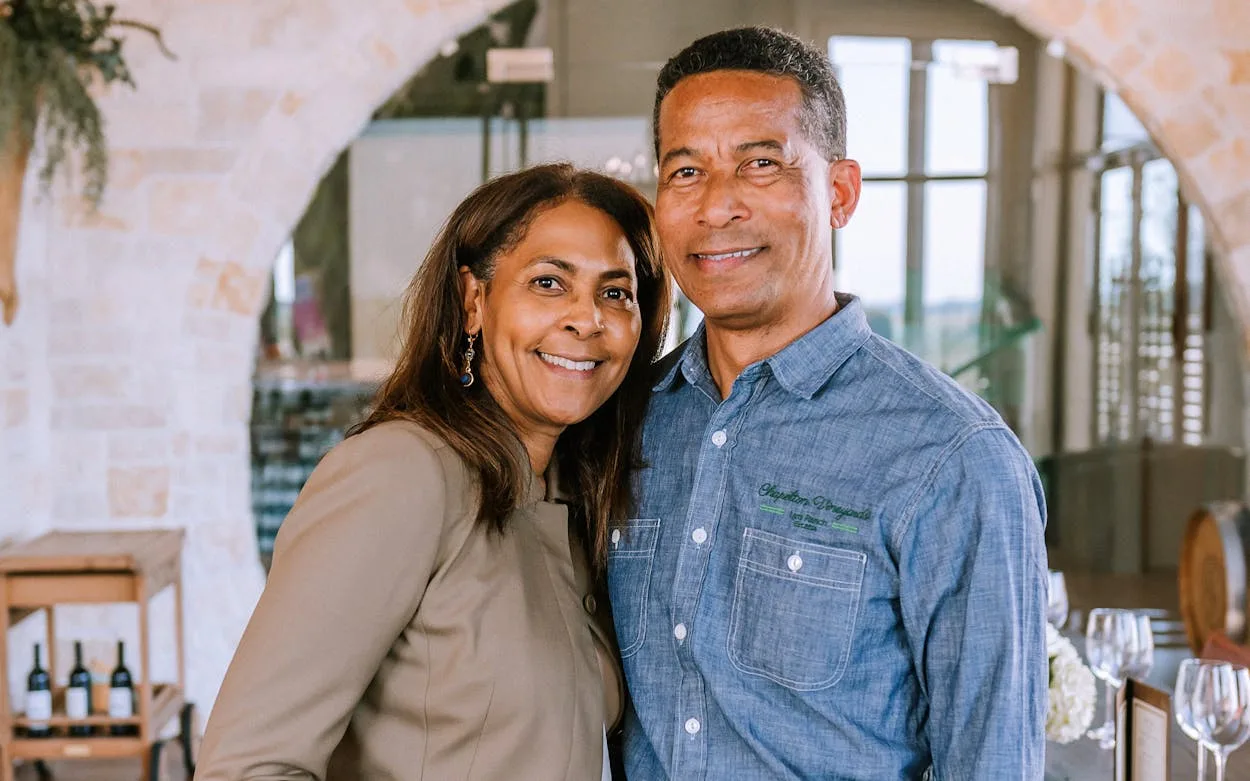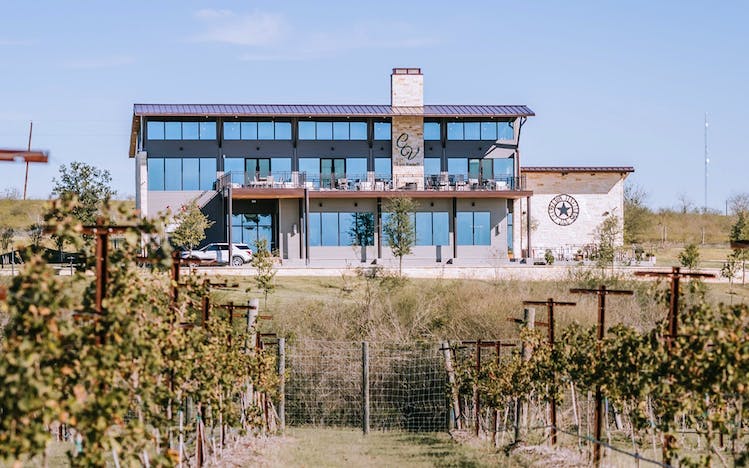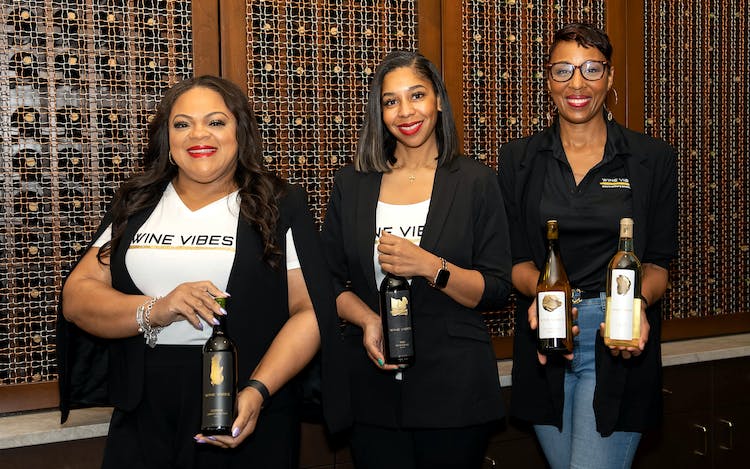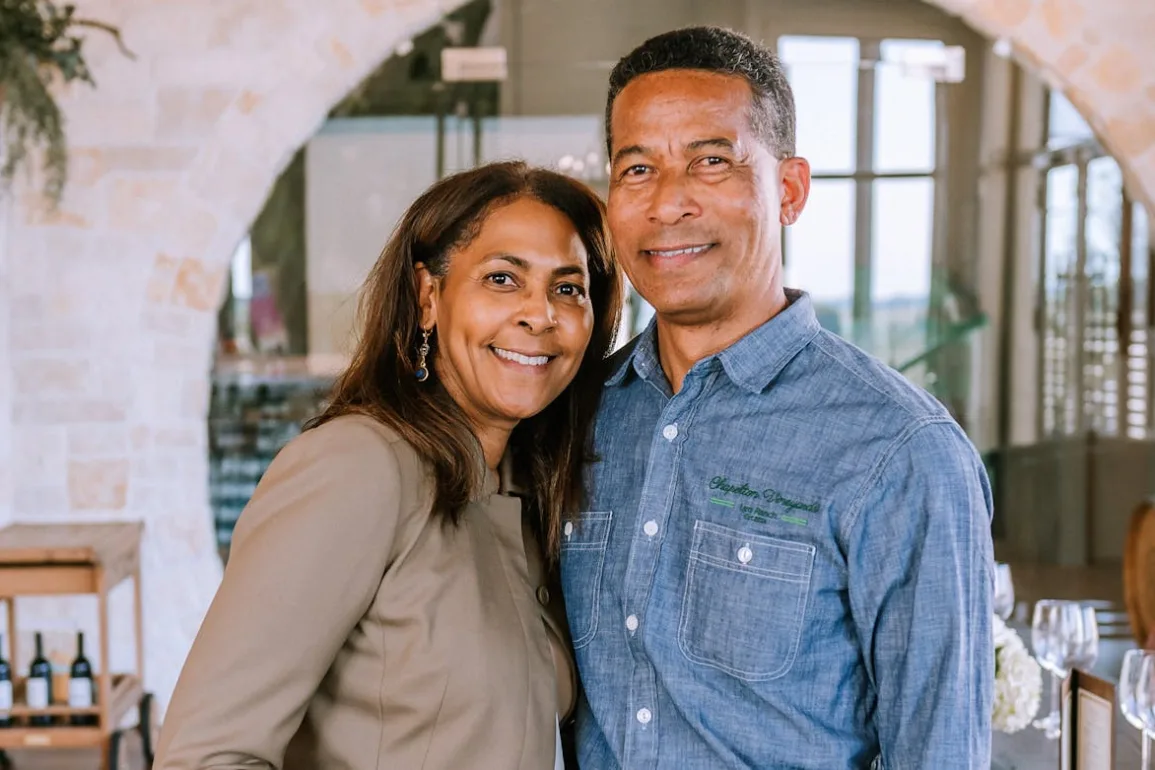Black Winery Owners in Texas Hope to Leave a Legacy for Future Generations
Fewer than one percent of the country’s wineries are Black-owned, but these entrepreneurs are hoping to change the statistic.

Courtesy of Chapelton Vineyards
On their honeymoon trip to Italy in 2016, Carissa and Kenneth Stephens found themselves in a small town called Todi in the region of Umbria, bonding with the townspeople.
All it took was a glass of wine.
“We were able to sit across the table from people clear across the world, but still have a very deep and meaningful connection over what we were drinking,” Carissa Stephens says.
When the Stephenses got back home to Houston, they continued to develop their palates by traveling and tasting wine from different regions of the world.
Still, just tasting wine wasn’t enough. In 2018, when sitting on the couch next to Kenneth, an attorney, as he worked on a legal document and she worked on a marketing proposal for her corporate job, she had an epiphany. Whenever they were adventuring together or excited to learn something new, it usually revolved around wine. Could they start their own wine brand?
“We wanted to be part of the representation that we weren’t seeing in the industry,” Stephens says. “Here in Houston, we were looking to our right and looking to our left. It was difficult to find a Black-owned wine product at that time.”
Out of more than 11,000 wineries across the country, fewer than one percent are Black-owned, according to the Association of African American Vintners. However, in Texas, several Black-owned wineries have opened since the pandemic, signaling a slow change in the mostly white industry. Black winery owners are looking to bring more representation and also hope to spawn a new generation of winemakers.
Around the time the Stephenses were discovering their love for wine, Sheila Adams was thinking about what she planned to do after she retired from the military in 2016. She kept telling her husband she wanted to open her own business.
Adams was stationed in San Antonio multiple times, and she, her husband, and their two kids would often tube at Guadalupe River State Park in Spring Branch, a small town about forty minutes north of San Antonio. The area reminded Adams of where she grew up in Michigan, which was surrounded by lakes and rivers.
As Adams looked at different business ventures, she noticed the number of wineries, distilleries, and breweries was growing in Texas. She wasn’t interested in drinking whiskey or beer, so she settled on wine. She visited more than 35 wineries across the state, including Becker Vineyards, Inwood Estates Vineyards, and Blue Lotus Winery, peppering their owners with questions: Why did you get in this business? What would you have done differently? What are some challenges that you’re dealing with?
Shortly after she retired, she began looking for land in early 2017 and settled on Spring Branch, the area she had grown to love.
“For me, it’s a legacy. I know this is something I want to hand to my daughters,” Adams says. “They take it over and they can do some other amazing things.”
However, it was a long journey from the time Adams purchased her land in Spring Branch to when she opened for business. Adams hired a wine consultant—who served as her own private tutor for three years and educated her about the industry—an architect to design the building, and builders who began construction in May 2018. She and her husband put together the chandeliers, bar, counters in the kitchen, and other odds and ends.
Finally, she opened Kai-Simone Winery, named after her daughters, in October 2019. Even though Adams planted a vineyard last year, she sources the majority of her grapes from other Texas vineyards or California, noting how Texas vineyards can be unreliable because of the unpredictable weather. Her own vines have already endured a summer drought and a winter freeze. But Adams and her team make their wine on site, and this year, their most popular wines include cabernet sauvignon, red zinfandel, chardonnay, and riesling.
Meanwhile, Stephens’ idea for a wine brand was becoming a reality. She and her husband established relationships with others in the wine industry and traveled back and forth to Napa Valley.
In March 2020, they planned to release their products under the name Pur Noire. They envisioned throwing a huge release party with a full band and wait staff. The week before their sold-out event, the state of Texas shut down and residents were ordered to stay at home. Stephens was devastated.
“I didn’t know what would come of the brand,” Stephens says. “I didn’t know if anyone would care about this new wine brand in the midst of trying to figure out their health and safety.”
They pushed through and did a virtual launch of their wines, which are made with grapes from California. They ended up selling out of their Pur Epiphany (a petite sirah–based blend), Pur Euphoria (a rosé), and Pur Elevation (a pinot gris). The couple’s ambition grew larger. What if they opened a tasting room?
At the same time, Black businesses across the country were getting more attention than ever as the death of George Floyd spawned protests and a push grew to support Black-owned businesses. During the summer of 2020, 75 percent of Black business-owners reported seeing a spike in customers according to a poll of more than four hundred Black business-owners by Groupon and the National Black Chamber of Commerce. By 2021, Black business ownership increased by 28 percent, according to a University of California, Santa Cruz analysis.
In late 2021, the Stephenses became a part of that growing trend, opening their downtown tasting room, Pur Noire Urban Wineries, the first Black-owned winery in Houston.
“You’re seeing people of color creating opportunities for themselves,” Stephens says. “Instead of waiting for a seat at somebody’s table, we’re building our own tables.”


A group of mothers in Pearland and a couple near Brenham were also striving to make their ideas for a winery into a reality.
Sheri Lawal Price, Tamesha Hampton, and Phelicia Colvin, owners of Wine Vibes in Missouri City, a suburb of Houston, wondered over lunch in 2019: What was there to do in their suburb besides go out to eat? In order to have more activities to do around them, they decided to open a winery. However, the women initially faced challenges building relationships in the industry.
“We don’t have the legacy of someone in our family or a family friend that can show us the ropes,” Lawal Price says. “Somebody that has the legacy; they can pick up the phone and say, ‘Can you do me this favor?’ ”
Lawal Price relied on her family’s history with wine. Her grandfather harvested grapes on his property in West Columbia, southwest of Houston, and made homemade wine for his family. Her mom formed a group with her girlfriends called the Divine Divas, which took winery trips—even venturing to Italy and Paris—and Lawal Price would sometimes join in.
Wine Vibes get its grapes mostly from California and Washington State, but the owners do everything else themselves, including tasting, filtering, bottling, and labeling. One of the wines, the Trio—a blend made of petite sirah and zinfandel—is named after the three women and represents their personalities.
On a weeknight in July, a diverse crowd gathered inside the tasting room—a couple on a date night, a large birthday celebration, and a group of girlfriends with wine glasses scattered around the table.
“Once people get in here, they’re here until we close,” Lawal Price says.
Out near Brenham, Michelle Lyn, an emergency room doctor, and Kirk Lyn, an attorney, were also newbies to the wine business. Kirk would drive back and forth to Austin frequently for work and admired the beautiful scenery along Highway 290. In 2014, they bought a ranch in Washington County, near Brenham. Initially, Kirk planned to raise cattle there, but after talking to others, he realized it wasn’t for him. He and his wife settled on planting a small vineyard.
“The original idea when we first built the place was that we actually would not really open it to the public; we were gonna keep the gate closed,” Kirk says. “When we first opened it, we left the gate open one day, and people drove in. We were like, ‘Maybe this is not such a bad idea.’ ”
Their winery, Chapelton Vineyards, which opened last year, is named after Kirk’s favorite town in Jamaica. It has grown into a massive property with rows of lush vineyards, villas to stay overnight, and a restaurant on site. Aside from their own grapes, they also source from California, Washington State, the Texas High Plains, Uruguay, and Argentina. Their most popular wine, the Estate Blanc du Bois, has hints of grapefruit, pear, and tropical fruit flavors.
“Part of the reason why we thought this would work is because Houston is the fourth-largest city in the country, and there’s nothing like this within an hour,” Kirk says. “You have to go to Fredericksburg.”
At the Stephenses’ tasting room in downtown Houston, they’ve seen wedding proposals, birthdays, and retirement parties. The couple hope to expand their tasting room into other major cities.
Stephens is already thinking ahead about her four-year-old daughter—one of her first words was “winery.”
“If wineries in Europe and other parts of the world can have standing wineries for generation after generation, we’ve gotta start somewhere,” Stephens says. “Why can’t we?”



